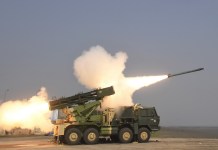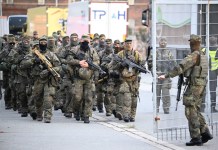Two Pakistan Army soldiers were killed on Saturday in a clash with suspected militants near the country’s northwestern border with neighboring Afghanistan, an official statement said.
Narendra Modi Second Indian Prime Minister To Win Ig Nobel Prize 2020
The attack — latest one in a string of ambushes on security forces following the kick start of rare direct talks between the Taliban and Kabul government in Qatar’s capital Doha last week — took place near Miranshah, the capital of the restive North Waziristan tribal region.
“Security forces conducted an IBO [intelligence based operation] in Spalga, Miranshah. During the exchange of fire, two soldiers embraced shahadat [martyrdom],” said a statement by the Pakistan army’s media wing — the Inter-Services Public Relations.
“Troops cordoned off the area for clearance,” it added.
The attack followed the killing of a key militant commander, Ihsan Ullah, along with his three accomplices in North Waziristan on July 13.
North Waziristan — once dubbed the heartland of militancy — is one of seven former semi-autonomous tribal regions in Pakistan where the army has conducted a series of operations since 2014 to eliminate Tehreek-e-Taliban Pakistan (TTP).
Successive operations have pushed the TTP towards neighboring Afghanistan, and Islamabad claims the terrorist network has now set up bases across the border to attack Pakistani security forces.
The military operations also displaced over 1 million people, but the government claims most of them have returned to their homes. In 2018, the tribal agencies were given the status of districts and merged with the Khyber Pakhtunkhwa province.
Pakistan demands inquiry into the killing of 3 Kashmiris
Pakistan on Saturday called for a “transparent” judicial inquiry, under international scrutiny, into the “extra-judicial” killing of three Kashmiris in the Indian-administered Kashmir in July.
In a rare admission of wrongdoing, the Indian army on Friday admitted that its soldiers exceeded their powers during an alleged “staged gun battle” that killed three youths in the Shopian district of the disputed Himalayan region.
The family members of the three missing cousins, 25-year-old Imtiyaz Ahmed, 20-year-old Mohammad Ibrar, and 16-year-old Abrar Ahmed had alleged that the Indian army killed the trio in a staged gunfight and passed them off as militants.
“As the world community is aware, since its illegal and unilateral actions of 5 August 2019 in IIOJK [Indian illegally occupied Jammu and Kashmir], India has taken its brutalization of innocent Kashmiris to a new level,” said a statement by the Foreign Ministry.
More than 300, mostly young, Kashmiris have been “extra-judicially” killed by the Indian forces in “fake encounters” and staged “cordon-and-search” operations during the past year, it added.
“Pakistan has been consistently sensitizing the world community, including the United Nations and the international human rights organizations, about India’s serious crimes against the Kashmiri people,” the statement said, adding: “The Indian Army’s statement of 18 September is an acknowledgment that Indian occupation forces are guilty of war crimes in IIOJK.”
Holding the ruling Bhartiya Janata Party (BJP) leadership “directly responsible for crimes” against the Kashmiri people, it said no illegal and inhuman acts can provide impunity against the crimes that are being perpetrated in the disputed valley.
“India should be well-aware that use of brutal force, including extra-judicial killings, enforced disappearances, torture in custody, use of pellet guns, burning and destruction of Kashmiris’ houses to inflict collective punishment, cannot break the will of Kashmiri people in their just struggle for the inalienable right to self-determination,” it went on to charge.
“The international community must take immediate cognizance of the 18 July 2020 episode in IIOJK as well as other acts indicative of the RSS [the Rashtriya Swayamsevak Sangh party]-BJP regime’s genocidal tendencies and hold it accountable for continuing crimes against the Kashmiri people,” the statement concluded.




